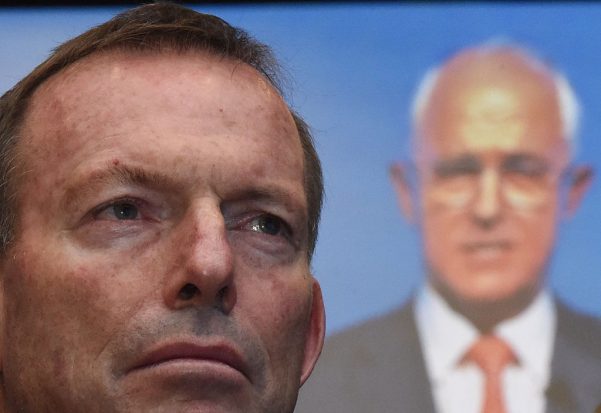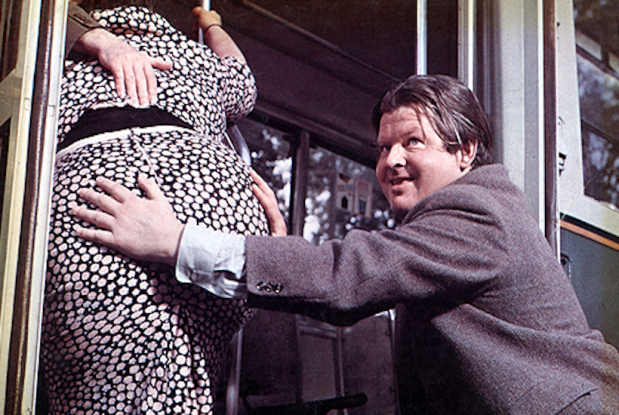 Surely you’ve all seen Tony Abbott’s punchy op-ed in The Australian, and the wee tiff it’s sparked within the Liberal government. In case not, here’s the gist of it: Abbott calls for greater deregulation to match the incoming President Trump’s proposed reforms. He recommends the PM start with the 2020 Renewable Energy Target. Josh Frydenburg politely tells the Hon. Mr Abbott to get stuffed.
Surely you’ve all seen Tony Abbott’s punchy op-ed in The Australian, and the wee tiff it’s sparked within the Liberal government. In case not, here’s the gist of it: Abbott calls for greater deregulation to match the incoming President Trump’s proposed reforms. He recommends the PM start with the 2020 Renewable Energy Target. Josh Frydenburg politely tells the Hon. Mr Abbott to get stuffed.
One’s struck by the resemblance between Abbott’s piece and one published last year (also in The Oz) by Grace Collier. Ms Collier likewise suggests that Trump’s reforms will create a ‘tax haven’, seducing employers away from Australia and other developed countries. This is pretty much the consensus among centre-right commentators: Australia must to brace itself for the banana-republicification of the United States.
But hold on a second. Is Trump going to be a revolutionary president because he’s an orthodox, entitlement-slashing, bureaucrat-bashing neoliberal? Or is he a mild but gutsy economic nationalist?
According to Trump himself, he’ll grow the economy as much with targeted tax cuts (like those promised to Carrier) and the punitive tariffs (e.g. the border tax) as he will by cutting corporate rates across the board. Aussie neoliberals are starting to believe him, which is why they avoid the topic so assiduously. Sure, they might dismiss him as a ‘crony capitalist’ in private; but they know it’d be politically stupid to publicly contradict the methods of a man who’s delivered over a million new jobs and attracted billions in foreign investments… before officially taking office.
Oh, sorry – spoke too soon. Mr Turnbull is also using The Oz to bring his message to the people, only he’s come out swinging against the economic nationalists. ‘Today,’ he writes,
In the face of rising protectionism, our commitment to open markets is more important than ever…
It is true that uneven growth, combined with rapid change, can create a platform for divisive voices that aim to play on our anxieties and generate fear. It is imperative we resist those voices urging us to close ourselves off from the world because protectionism is a path to poverty. Turning our backs on international trade and investment would block our businesses from world markets and raise the cost of goods and services for our people.
It is, ironically, an article ostensibly about Australia’s commercial relations with Japan, the most protectionist country on the planet.
But that doesn’t matter. I’m making peace with the possibility that Abbott will be leader of the Liberal Party again. It’s not ideal, but it’s acceptable – especially given the status quo. One hopes he realizes, though, that he won’t get away with accusing protectionists of racism and xenophobia the way he did back in 2015. That doesn’t fly anymore.
As I’ve been saying, the neoliberal consensus is coming undone, and politicians on the centre-right need to choose their words very carefully. They can’t assume their base is for unrestricted globalism and free trade, even if they themselves are. Nor can they lean on middle- to upper-middle class electorates with their fiscal cosmopolitanism. The Right is increasingly reliant on working-class voters, most of whom would be fine if the Aussie economy was far more self-sustaining. America’s being flooded with good jobs, and they want some too.
Look, I’m not the one to say where protectionism should and shouldn’t be employed. Maybe Turnbull is right, and there’s literally no sector of the economy that would presently stand to benefit from state protections. And maybe Abbott is also right: maybe Trump’s generic tax cuts will serve the economy better than his casual interventions into global finance.
But, if so, prove it. Show your work. Make the case to the Australian people, just as Trump makes his to the American people. Tell them in plain English how your new free-trade agreement with Japan or China or Zimbabwe will (a) create sustainable jobs for Australian workers while (b) attracting overseas investments without (c) driving up the cost of living for blue-collar families.
Never mind this ideological hogwash about ‘the invisible hand of the market’. Never mind if the denizens of Point Piper have to pay an extra $3 on a $1,000 bottle of 2007 Montrachet Grand Cru. All that pandering to the well-off went out the window in 2016. Now, if it really is Aussie workers’ best interests that they lose their jobs to wage-slaves in communist China; you’ll have to prove it to them.
So, uh, good luck.
























